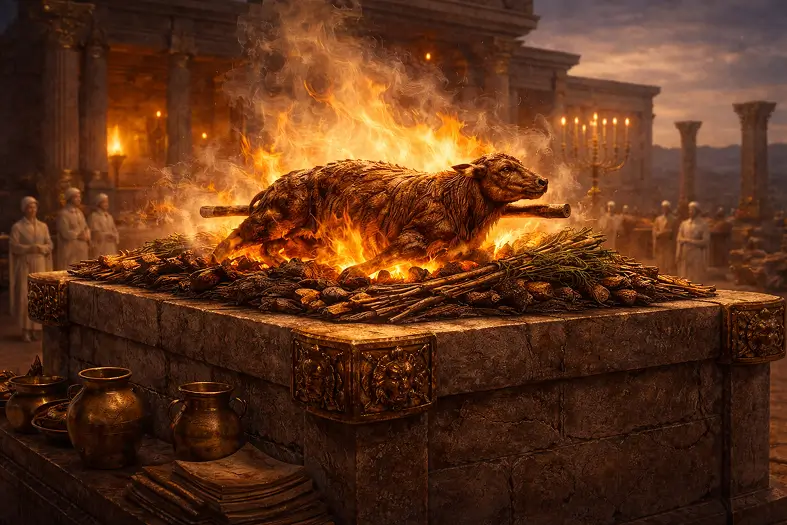


The Korban Pesach Sheni must be eaten on the night of the 15th of Iyar with matzah and maror.
This mitzvah commands that those who were unable to bring the Pesach sacrifice in Nissan due to impurity or distance must eat it one month later, on the 15th of Iyar, with matzah and maror. Rambam (Hilchot Korban Pesach 5:7–9) rules that Pesach Sheni is eaten like the first Pesach, with all its laws of roasting, group division, and accompaniments.
Sefer HaChinuch (Mitzvah 382) emphasizes that Hashem granted this mitzvah as an expression of mercy, so that no Jew would be left outside the covenantal celebration of redemption. Talmud (Pesachim 95a) details its halachot: though similar to the first Pesach, it lacks the festival status of Yom Tov. Rashi (Num. 9:11) underlines the importance of matzah and maror, keeping Pesach Sheni tied to the Exodus memory. Ramban explains that this mitzvah reveals Hashem’s patience and compassion, extending the covenant to those who missed it initially.
Commentary & Classical Explanation:
Contrast with Eating the First Pesach (Mitzvah 408):
Parallel to Yom Kippur (Mitzvah 400):


Concerns the Beit HaMikdash, korbanot (offerings), and priestly service.
Mitzvot that strengthen communal life — showing up, participating, supporting, and belonging. Community is where holiness is shared, prayers are multiplied, and responsibility becomes collective.
Represents Emunah—the deep, inner trust in Hashem’s presence, oneness, and constant involvement in our lives. This badge symbolizes a heartfelt connection to G-d, rooted in belief even when we cannot see. It is the emotional and spiritual core of many mitzvot.
Empathy in motion — responding to another’s pain with sensitivity, patience, and understanding. Whereas chesed gives broadly, rachamim responds gently, tailoring care to a person’s emotional or spiritual needs.
Represents the concept of spiritual intentionality, purity, and sanctity—set apart for a higher purpose.
Mitzvot that define and deepen the relationship between a person and their Creator. These include commandments involving belief, prayer, Shabbat, festivals, sacrifices, and personal holiness — expressions of devotion rooted in divine connection.

Dive into mitzvos, prayer, and Torah study—each section curated to help you learn, reflect, and live with intention. New insights are added regularly, creating an evolving space for spiritual growth.

Explore the 613 mitzvos and uncover the meaning behind each one. Discover practical ways to integrate them into your daily life with insights, sources, and guided reflection.

Learn the structure, depth, and spiritual intent behind Jewish prayer. Dive into morning blessings, Shema, Amidah, and more—with tools to enrich your daily connection.

Each week’s parsha offers timeless wisdom and modern relevance. Explore summaries, key themes, and mitzvah connections to deepen your understanding of the Torah cycle.